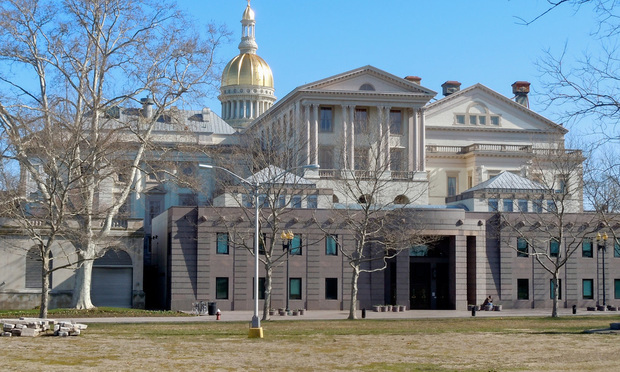Judicial Independence Under Siege Again
We call on the Legislature to reject SCR-47 and S-1047. Instead, all those who support our independent judiciary should continue to push for an increase in the mandatory retirement age.
February 23, 2020 at 10:00 AM
3 minute read
 New Jersey State House in Trenton
New Jersey State House in Trenton
Just when we thought we were rebuilding our judiciary's sense of independence from political interference (of course original gubernatorial nomination and Senate confirmation do involve politics but it is before a candidate has a judicial paper trail), a proposed amendment to our Constitution (together with an implementing bill) have raised the serious possibility of entrenched legislative involvement in the tenure of justices and judges beyond the mandatory retirement age of 70. Despite earlier unsuccessful attempts to raise this to 75, recall by the Supreme Court has been upheld, albeit narrowly. These two proposals would go further to authorize the state Senate, with no check, to enable certain justices or judges to stay on full time, for two-year terms, past the age of 70. This would be an ill-advised adjustment to our fundamental arrangement of governmental authority.
SCR-47, and its implementing legislation, S-1047, both recently introduced, would enable the Senate to choose which judges to exempt from the existing mandatory retirement age of 70, with no involvement of the governor. Senate cosponsor Nicholas Scutari said, in support of the plan, that some judges would like to stay on and "There are some really good ones who should stay on." As we see it, this view constitutes a dangerous erosion of our hard-earned judicial independence. The plan is in fact not based on a judge's desire to "stay on," but rather on, first the Senate Judiciary Committee's, and then the full Senate's, unreviewable judgment that a justice or judge is "good." That important judgment would be in the eye of the senatorial beholder, and would almost always involve a judgment on whether the senator agreed with the justice's or judge's decisions.
As documented in detail by former Judge Nelson Johnson, in his 2014 book "Battleground New Jersey: Vanderbilt, Hague, and Their Fight for Justice," the structure of our current judicial branch was the product of a multi-decade political battle over control of the courts. We have expressed our support for this structure, which in 1947 replaced one of the worst, and most politicized, court systems in the country. The advent of unilateral Senate decision-making on judicial extensions could inject local, legislative politics (particularly problematic for trial judges), based on a justice's or judge's prior decisions, into this purported decision of the merits of what is "good." We know there can be a very wide difference of opinion on who is a "good" justice or judge.
We call on the Legislature to reject these amendments, and resist the rush to get the constitutional amendment on the 2020 ballot. All those who support our independent judiciary should continue to push for an increase in the mandatory retirement age to 75, and encourage the governor to continue making judicial tenure decisions based only on the merits of the justice's or judge's judicial performance.
This content has been archived. It is available through our partners, LexisNexis® and Bloomberg Law.
To view this content, please continue to their sites.
Not a Lexis Subscriber?
Subscribe Now
Not a Bloomberg Law Subscriber?
Subscribe Now
NOT FOR REPRINT
© 2025 ALM Global, LLC, All Rights Reserved. Request academic re-use from www.copyright.com. All other uses, submit a request to [email protected]. For more information visit Asset & Logo Licensing.
You Might Like
View All


Trending Stories
- 1States Accuse Trump of Thwarting Court's Funding Restoration Order
- 2Microsoft Becomes Latest Tech Company to Face Claims of Stealing Marketing Commissions From Influencers
- 3Coral Gables Attorney Busted for Stalking Lawyer
- 4Trump's DOJ Delays Releasing Jan. 6 FBI Agents List Under Consent Order
- 5Securities Report Says That 2024 Settlements Passed a Total of $5.2B
Who Got The Work
J. Brugh Lower of Gibbons has entered an appearance for industrial equipment supplier Devco Corporation in a pending trademark infringement lawsuit. The suit, accusing the defendant of selling knock-off Graco products, was filed Dec. 18 in New Jersey District Court by Rivkin Radler on behalf of Graco Inc. and Graco Minnesota. The case, assigned to U.S. District Judge Zahid N. Quraishi, is 3:24-cv-11294, Graco Inc. et al v. Devco Corporation.
Who Got The Work
Rebecca Maller-Stein and Kent A. Yalowitz of Arnold & Porter Kaye Scholer have entered their appearances for Hanaco Venture Capital and its executives, Lior Prosor and David Frankel, in a pending securities lawsuit. The action, filed on Dec. 24 in New York Southern District Court by Zell, Aron & Co. on behalf of Goldeneye Advisors, accuses the defendants of negligently and fraudulently managing the plaintiff's $1 million investment. The case, assigned to U.S. District Judge Vernon S. Broderick, is 1:24-cv-09918, Goldeneye Advisors, LLC v. Hanaco Venture Capital, Ltd. et al.
Who Got The Work
Attorneys from A&O Shearman has stepped in as defense counsel for Toronto-Dominion Bank and other defendants in a pending securities class action. The suit, filed Dec. 11 in New York Southern District Court by Bleichmar Fonti & Auld, accuses the defendants of concealing the bank's 'pervasive' deficiencies in regards to its compliance with the Bank Secrecy Act and the quality of its anti-money laundering controls. The case, assigned to U.S. District Judge Arun Subramanian, is 1:24-cv-09445, Gonzalez v. The Toronto-Dominion Bank et al.
Who Got The Work
Crown Castle International, a Pennsylvania company providing shared communications infrastructure, has turned to Luke D. Wolf of Gordon Rees Scully Mansukhani to fend off a pending breach-of-contract lawsuit. The court action, filed Nov. 25 in Michigan Eastern District Court by Hooper Hathaway PC on behalf of The Town Residences LLC, accuses Crown Castle of failing to transfer approximately $30,000 in utility payments from T-Mobile in breach of a roof-top lease and assignment agreement. The case, assigned to U.S. District Judge Susan K. Declercq, is 2:24-cv-13131, The Town Residences LLC v. T-Mobile US, Inc. et al.
Who Got The Work
Wilfred P. Coronato and Daniel M. Schwartz of McCarter & English have stepped in as defense counsel to Electrolux Home Products Inc. in a pending product liability lawsuit. The court action, filed Nov. 26 in New York Eastern District Court by Poulos Lopiccolo PC and Nagel Rice LLP on behalf of David Stern, alleges that the defendant's refrigerators’ drawers and shelving repeatedly break and fall apart within months after purchase. The case, assigned to U.S. District Judge Joan M. Azrack, is 2:24-cv-08204, Stern v. Electrolux Home Products, Inc.
Featured Firms
Law Offices of Gary Martin Hays & Associates, P.C.
(470) 294-1674
Law Offices of Mark E. Salomone
(857) 444-6468
Smith & Hassler
(713) 739-1250







